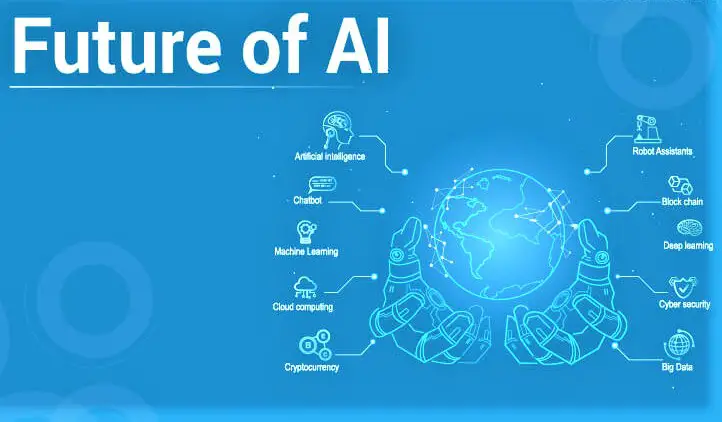Artificial Intelligence: The future of AI presents significant challenges to the digital landscape. Ethical concerns demand responsible AI development. Reskilling programs can address job displacement. Data privacy and security must be prioritized. International cooperation is essential for AI governance. Preparing for superintelligent AI requires careful consideration and safeguards. With proactive measures, we can ensure AI’s potential is harnessed for a better and safer future.

What is the Future of Artificial Intelligence?
Artificial Intelligence (AI) has been an emerging technology that promises to revolutionize various industries and reshape our society. Its rapid advancements have led to remarkable achievements, from speech recognition to autonomous vehicles, and even drug discovery. However, as we embrace the potential of AI, we must be mindful of the challenges that lie ahead. This article will explore five significant challenges that could shape the future of AI and the digital landscape.
Ethical Concerns:
One of the most critical challenges AI faces is the ethical implications of its implementation. As AI algorithms gain autonomy, they could inadvertently cause harm or perpetuate bias if not appropriately designed and regulated. Concerns about the ethical use of AI span across various sectors, including autonomous weapons, privacy invasion, and algorithmic bias.
To address these concerns, researchers, policymakers, and industry leaders must collaborate to establish clear guidelines for AI development and deployment. Ethical AI frameworks should prioritize transparency, fairness, accountability, and privacy to ensure that AI technologies are built and used responsibly.
Job Displacement and Reskilling:
AI’s rapid progress has led to concerns about job displacement, as automation threatens to replace certain tasks traditionally performed by humans. While AI has the potential to improve productivity and efficiency, it may also lead to job loss in specific sectors. The challenge lies in retraining the workforce to acquire skills that complement AI technology rather than compete against it.
Governments, businesses, and educational institutions must work together to establish comprehensive reskilling and upskilling programs to empower workers to adapt to the changing job landscape. This collaboration can help mitigate job displacement while preparing the workforce for the AI-driven future.
Data Privacy and Security:
As AI systems become more sophisticated, they increasingly rely on vast amounts of data to learn and make informed decisions. However, this dependence on data raises serious concerns about privacy and security. The improper use or mishandling of sensitive data can result in privacy breaches and potentially catastrophic consequences.
To ensure the future of AI is secure and respects individuals’ privacy, stakeholders must prioritize robust data protection mechanisms, implement strong encryption standards, and enforce stringent regulations around data usage. Additionally, developing AI models with privacy-preserving techniques can strike a balance between leveraging data and safeguarding user information.
AI Governance and Regulations:
The global nature of AI technology presents a challenge for establishing uniform governance and regulations. Different countries and regions have diverse approaches to AI governance, making it challenging to harmonize international policies.
To address this challenge, international collaborations, and standardization efforts are vital. Multilateral agreements can set benchmarks for responsible AI development and usage, facilitating global consensus on the ethical, legal, and societal implications of AI technology.
Superintelligent AI and Existential Risk:
While we are still in the early stages of AI development, discussions about superintelligent AI and its potential impact on humanity have become prominent. Superintelligent AI refers to an AI system that surpasses human intelligence, and its emergence could pose existential risks if not properly controlled.
Researchers and policymakers must carefully consider the implications of developing superintelligent AI and establish safeguards to ensure its behavior aligns with human values. The implementation of value-aligned AI systems, rigorous testing, and continuous monitoring are essential to mitigate potential risks associated with superintelligent AI.
Conclusion:
The future of AI is bright, filled with promises of technological advancements and transformative innovations. However, it is essential to recognize and address the challenges that lie ahead to create a responsible and sustainable digital future. By prioritizing ethics, reskilling the workforce, safeguarding data, establishing proper governance, and carefully approaching the development of superintelligent AI, we can pave the way for an AI-driven world that benefits humanity and society at large. With collaboration and foresight, we can navigate these challenges and unlock the full potential of AI for a better tomorrow.
Faqs
Q: What is the future of AI?
A: The future of AI holds great potential for technological advancements and transformative innovations across various industries.
Q: What are the ethical concerns with AI?
A: Ethical concerns with AI involve issues of bias, privacy invasion, and the responsible use of AI algorithms to prevent harm.
Q: How does AI impact the job market?
A: AI’s rapid progress may lead to job displacement, necessitating reskilling and upskilling programs to adapt to the changing job landscape.
Q: How is data privacy addressed in AI development?
A: Data privacy in AI is ensured through robust protection mechanisms, strong encryption, and compliance with stringent regulations.
Q: What are the challenges in AI governance?
A: The global nature of AI technology poses challenges in establishing uniform governance and regulations worldwide.
Q: What is superintelligent AI, and what risks does it pose?
A: Superintelligent AI refers to AI systems surpassing human intelligence, potentially posing existential risks if not properly controlled and aligned with human values.
Q: How can we ensure a safe AI-driven future?
A: By prioritizing ethics, data privacy, reskilling the workforce, and implementing safeguards against superintelligent AI, we can shape a responsible and secure AI future